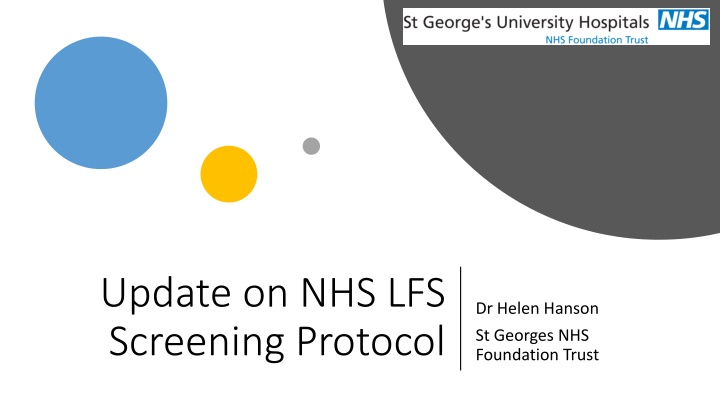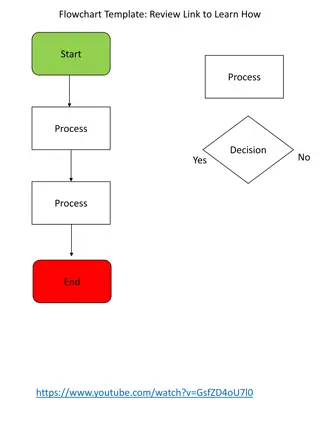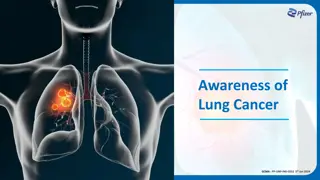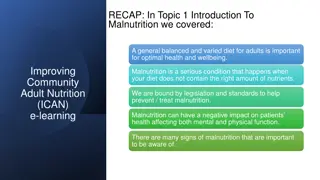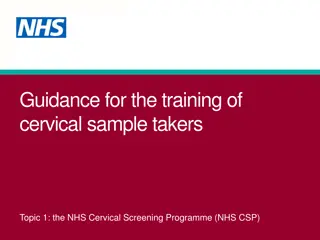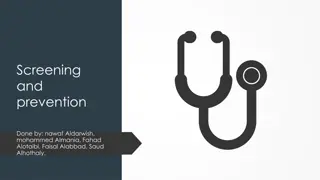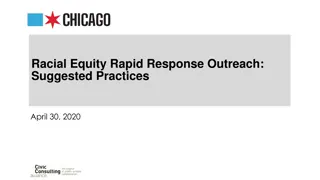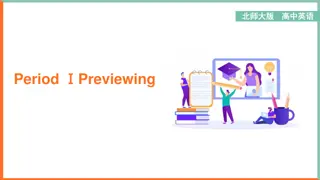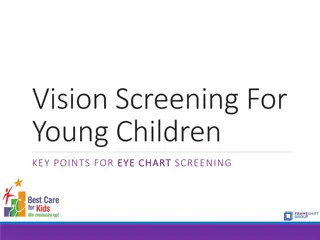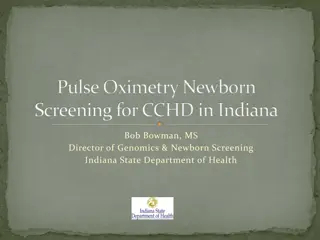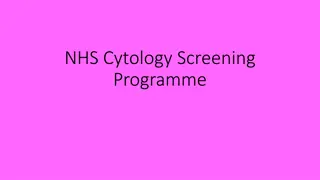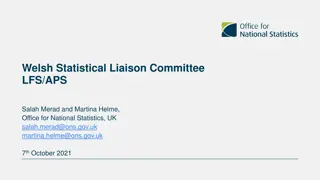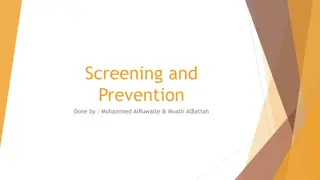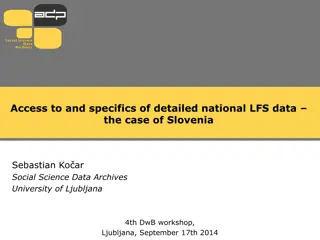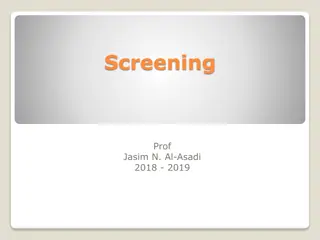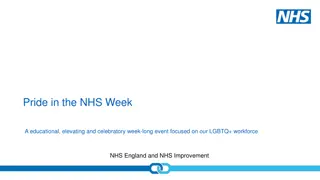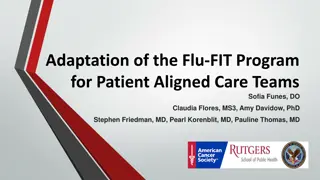Update on NHS LFS Screening Protocol by Dr. Helen Hanson
Screening recommendations in the UK for individuals with Li-Fraumeni syndrome (LFS) are evolving, with a focus on early cancer detection through comprehensive screening protocols. Recent consensus meetings have led to unified recommendations for tumour screening, addressing various cancer types and age groups. The UK Consensus Group provides detailed guidance on screening modalities such as abdominal ultrasound, breast MRI, brain MRI, and more. Barriers to implementation, including radiology expertise and funding, are acknowledged as challenges that need to be overcome for effective protocol execution.
Download Presentation

Please find below an Image/Link to download the presentation.
The content on the website is provided AS IS for your information and personal use only. It may not be sold, licensed, or shared on other websites without obtaining consent from the author.If you encounter any issues during the download, it is possible that the publisher has removed the file from their server.
You are allowed to download the files provided on this website for personal or commercial use, subject to the condition that they are used lawfully. All files are the property of their respective owners.
The content on the website is provided AS IS for your information and personal use only. It may not be sold, licensed, or shared on other websites without obtaining consent from the author.
E N D
Presentation Transcript
Update on NHS LFS Screening Protocol Dr Helen Hanson St Georges NHS Foundation Trust
Background : Screening recommendations in LFS UK- only National screening recommendations are for breast MRI from age 20 (NHSBSP) Increasing literature demonstrating early cancer detection through more comprehensive screening SIGNIFY (UK) Toronto protocol Villani et al. Lancet Oncol 2011 and 2016 Meta-analysis of baseline surveillance with WB-MRI in Li-Fraumeni syndrome. Ballinger et al. JAMA Oncology 2017
UK Consensus Meeting 6thJuly 2018 Aspiration for consistent UK approach meeting convened 6thJuly by UK CGG 43 attendees Clinical Genetics, Paeds Oncology, Radiology, Patients 3 discussion groups mixed specialties 3 sessions What? What screening should we recommend Who? Where? Adults /Children Local v national? Confirmed carriers only?
UK Consensus Group Recommendations UK Consensus Group Recommendations Tumour Screening recommendation ACC Abdominal USS 3-4 monthly birth-18 years Biochemistry (17 OH-progesterone, total testosterone, DHEAS, androstenedione) should only be performed where there is an unsatisfactory USS Breast Cancer Annual dedicated MRI from age 20-70 (As per NHSBSP 74) Consider risk reducing mastectomy from age 20 Brain tumour Annual dedicated brain MRI from birth (first MRI with contrast)* Sarcoma Annual WB-MRI from birth* Haematological Not indicated due to lack of evidence Colon Colonoscopy only indicated when family history of colorectal cancer or polyposis. Consider other, possibly co-inherited, causes as appropriate. Gastric Recommend Helicobacter pylori testing and eradication if required Endoscopy not indicated due to lack of evidence Skin Annual dermatology review from 18yrs (GP or Dermatology) Physical examination Full physical examination 3-4 monthly in children (including blood pressure, anthropometric measurements, signs of virilisation and neurological exam) Routine physical examination not recommended in adults advise detailed discussion of red flag symptoms and low threshold for fast track referral of persistent or unusual symptoms Other Recommend detailed discussion of red flag symptoms in both children and adults and provide information on relevant resources
Barriers to implementation Radiology expertise Radiology capacity MRI scanner Funding source
Commissioning Armed forces Commissioning for carers Critical care services Health and housing Health and justice Integrated Personal Commissioning Nutrition and hydration Primary care commissioning Primary care co-commissioning Public health commissioning Specialised services NHS England CCGs (Clinical commissioning groups) Commissioned services NHS services
Following meeting Discussion with Edmund Jessop, NHSE Specialised Commissioning Advised to put in application for PPP for annual WB-MRI and brain MRI First step approval by Medical Genetics CRG (Clinical Reference Group) CRG= groups of clinicians, commissioners, public health experts and patients who use their specific knowledge and expertise to advise NHS England on the best ways that specialised services should be provided. Discussed October 2018 agreed to support, pending review by Public Health Re-reviewed March 2019 (*CRG disbanded early 2019 and not reconvened) Application submitted June 2019
Outcome Considered by Specialised Commissioning, July 2019 Letter received mid-August Specialised commissioning will not support national funding Reasoning largely that do not fund screening for other cancer predisposition syndromes Follow up teleconference late August Recommendations NHSE can make a policy statement advising as best practice/standard of care, but funding will need to be sought locally Provide further evidence of why LFS different to other cancer predisposition syndromes Discuss further with Higher Specialised Commissioning
Conflicting factors Turnover of staff in Specialised Commissioning - MRI/surveillance is not normally a commissioning responsibility for NHSE - normally falls to CCGs. Argument made that WB-MRI for a rare cancer predisposition syndrome is not standard practice No Medical Genetics CRG currently sitting, so no group to push forward policy proposal Huge reconfiguration of Genetics services currently happening - priority for NHSE
What has been happening locally Some centres have been able to offer WB-MRI as small numbers of patients and Radiology departments have expertise and capacity Small numbers of patients have been able to access WB-MRI outside local area funded by local Trust/CCG Most Genetics centres currently unable to offer
What can we do next? What can we do next?
Appeal? Appeal?
Specialised Services Specialised services support people with a range of rare and complex conditions. They often involve treatments provided to patients with rare cancers, genetic disorders or complex medical or surgical conditions. They deliver cutting-edge care and are a catalyst for innovation, supporting pioneering clinical practice in the NHS. These services include a range of treatments, from interventions through to pioneering procedures and trials of treatments Specialised services are not available in every local hospital because they have to be delivered by specialist teams of doctors, nurses and other health professionals who have the necessary skills and experience. Unlike most healthcare, which is planned and arranged locally, specialised services are planned nationally and regionally by NHS England. In total, there are 146 specialised services directly commissioned by NHS England. Four factors determine whether NHS England commissions a service as a prescribed specialised service. These are: The number of individuals who require the service; The cost of providing the service or facility; The number of people able to provide the service or facility and The financial implications for Clinical Commissioning Groups (CCGs) if they were required to arrange for provision of the service or facility themselves.
Provide additional information of rarity of LFS and high cancer risk Provide additional information on WB-MRI Letter of support from TP53 Trust /UK CGG/ Cancer Genetics Leads Lost opportunity for national data collection if screening adhoc
Pursue different funding stream? Pursue different funding stream?
Higher Specialised Commissioning Highly specialised services are provided to a smaller number of patients compared to specialised services; usually no more than 500 patients per year. For this reason they are typically best delivered nationally through a very small number of centres of excellence. Process for application to HSC is currently being re-drafted and will be published soon Meeting mid October with Dr Ayesha Ali
